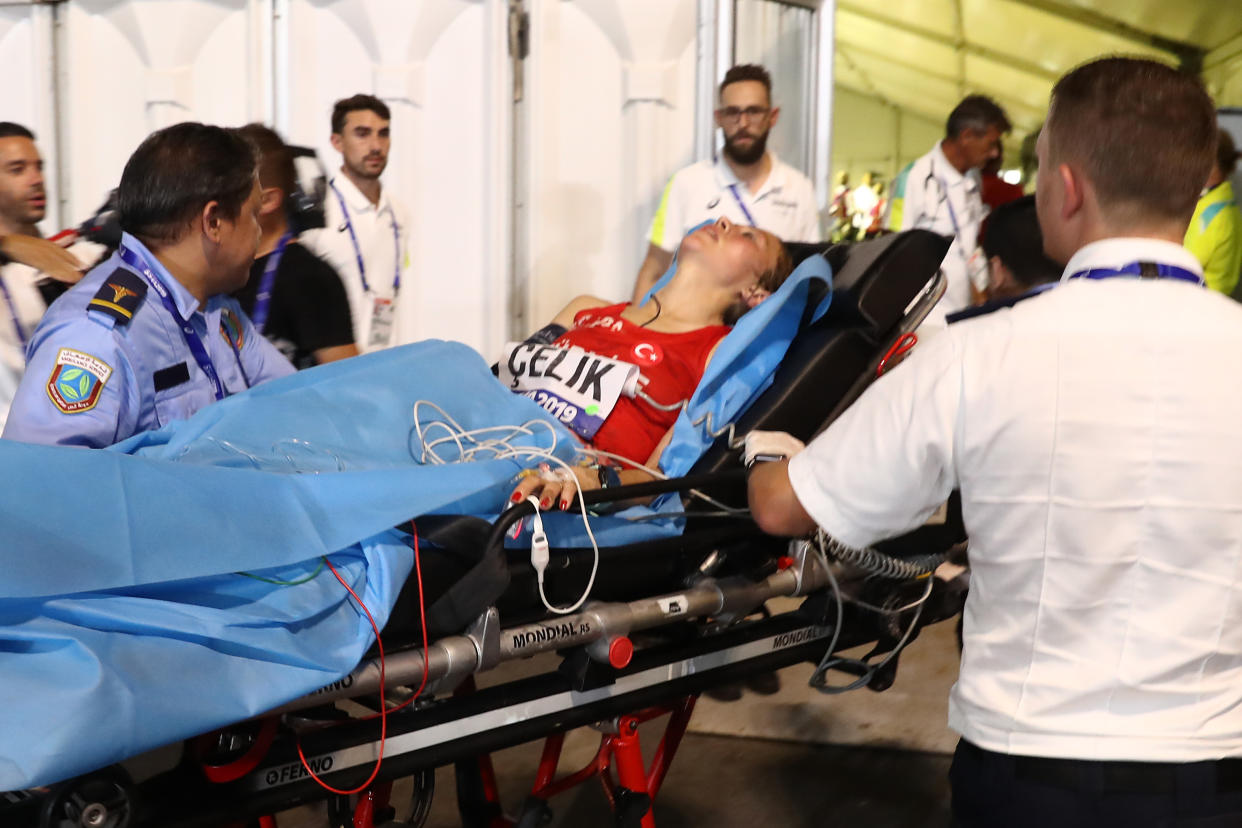'Boiling' heat in Qatar leads to 41 percent of runners failing to finish marathon at World Championships

As the 2019 World Athletics Championships kicked off in Doha, Qatar, there were many worries that the country’s sweltering summer temperatures could create dangerous conditions for the marathon and other distance-running events.
As it turned out, those worries were very much warranted.
28 out of 68 participants in the women’s marathon failed to finish the race on Saturday, despite organizers moving the event to midnight. That works out to 41 percent of the field being unable to run the full distance.
There's a pop-up hospital beside the marathon finish line. Every five minutes or so, a new athlete arrives on a stretcher. pic.twitter.com/99sljMj3WO
— Cathal Dennehy (@Cathal_Dennehy) September 27, 2019
By the event’s own metrics, the race began and ended with a temperature of 32 degrees Celsius (90 degrees Fahrenheit) and 74 percent humidity, a heat index of 107 degrees Fahrenheit.
“It's like you’re submerged underwater, but the water is boiling, and you’re kind of halfway cooked,” one distance runner said to freelance journalist Cathal Dennehy when describing the conditions.
The men’s marathon is scheduled for Oct. 5.
Ruth Chepngetich wins marathon with historically slow time
In a grueling race, someone had to win. That person was Kenya’s Ruth Chepngetich, who took home gold with a time of 2 hours, 32 minutes and 43 seconds to beat out 2017 world champion Rose Chelimo (2:33:46).
Chepngetich’s winning time of 2:32:43 was more than 15 minutes slower than her 2:17:08 time she ran earlier this year in the Dubai Marathon. It was also the slowest winning time in the history of the women’s marathon at the World Athletics Championships, as well as the first time since 2007 that a runner won with a time above two hours and thirty minutes.
Funnily enough, that 2007 race in Osaka, Japan, also saw grueling conditions. The race began at 27 degrees Celsius and 74 percent humidity before heating up and drying out to 32 degrees and 55 percent. Only nine runners were unable to finish in that event.
A marathon in Qatar was an extremely bad idea
Here’s the thing: None of this was surprising at all. It was predictable from the moment they announced the World Athletic Championships were coming to Doha, where temperatures sit in the 30-40 degree Celsius range (between 86 and 104 degrees Fahrenheit) every September. It is the first time a Middle Eastern country has every hosted a World Athletics Championships.
As Yahoo Sports’ Cassandra Negley noted before the race, a 2017 New York Times analysis found that fastest marathon times come during cooler days. Going from marathons run in the 40-degree Fahrenheit range to the 70s added four minutes to professional runners’ times. Imagine what a heat index of 107 will do to your system.
Organizers attempted to circumvent the heat through extra hydration stations and paramedics along the course, with the IAAF medical delegate having the authority to withdraw athletes before and during the race in the event of “severe distress.”
Clearly, the extra hydration only did so much, and the paramedics were needed often.
More from Yahoo Sports:

 Yahoo Lifestyle
Yahoo Lifestyle 

